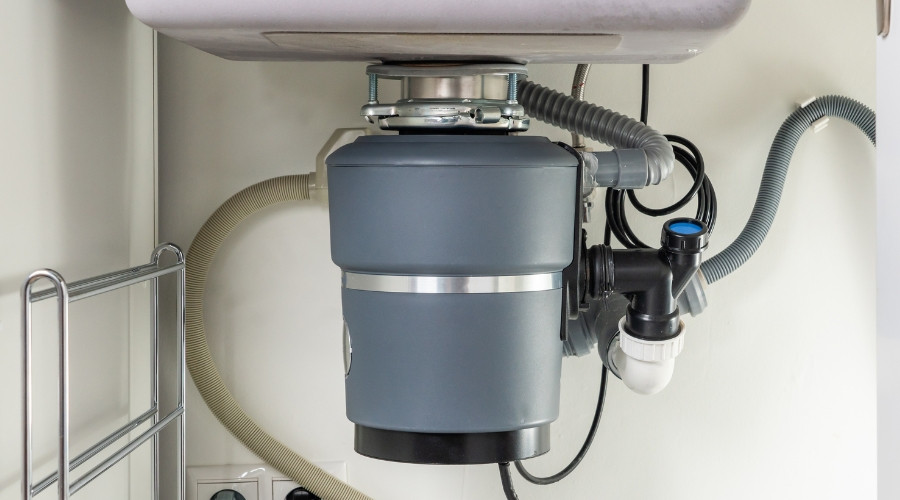How to Care for the Garbage Disposal and Avoid Clogs
A garbage disposal is convenient to have in the kitchen, making quick work of small food scraps to help them travel down the drainage system without causing clogs and helping to keep the sink clean. However, this convenience is quickly lost when the garbage disposal unit is misused, which can lead to clogs in the drain and sewer lines, a clogged garbage disposal, or the unit stops working and requires garbage disposal repair or garbage disposal replacement.
Fortunately, people in the home can help keep the garbage disposal running smoothly and prevent a drain or sewer line clog by adopting good habits. It doesn't require much effort—it mostly comes down to knowing what not to put down the drain and following a few simple usage habits.
Be Careful What Goes Down the Disposal
 The first rule of preventing problems with the disposal and avoiding clogs is being mindful of what goes into it. Many common kitchen scraps are notorious clog hazards and can damage the disposal, so they should never go down garbage disposals and drains. This includes fats, oils, and grease; starchy foods that expand with water, such as rice, pasta, and bread; fibrous foods, such as celery, artichokes, and pumpkin; and eggshells, potato peels, and coffee grounds. Additionally, items like fruit pits, nuts, and bones are too hard for garbage disposals and can damage the grinding mechanism and lead to a clog in the pipes.
The first rule of preventing problems with the disposal and avoiding clogs is being mindful of what goes into it. Many common kitchen scraps are notorious clog hazards and can damage the disposal, so they should never go down garbage disposals and drains. This includes fats, oils, and grease; starchy foods that expand with water, such as rice, pasta, and bread; fibrous foods, such as celery, artichokes, and pumpkin; and eggshells, potato peels, and coffee grounds. Additionally, items like fruit pits, nuts, and bones are too hard for garbage disposals and can damage the grinding mechanism and lead to a clog in the pipes.
Instead, reserve the garbage disposal for small amounts of soft food waste that are easily ground and flushed, such as fruit and vegetable scraps, except for items like pits, potato peels, and fibrous vegetables, small pieces of cooked meats, citrus rinds, and ice. When in doubt, it is always safer to put food waste into the trash or compost bin rather than risk a clogged sewer line, clogged garbage disposal, or garbage disposal breakdown.
Use Cold Water and Ice
 Running a steady stream of cold water is crucial whenever the garbage disposal unit is operating and for a full 30 seconds after it has been switched off. The cold water helps to solidify any minor amounts of fats or grease that might enter the unit, allowing them to be chopped up and flushed away instead of clinging to the blades or lining the pipes. The water also acts as a carrier, ensuring that all ground food particles are thoroughly washed through the grinding chamber, down the drainpipe, and safely into the main sewer line, preventing residual debris from settling and causing blockages and odors.
Running a steady stream of cold water is crucial whenever the garbage disposal unit is operating and for a full 30 seconds after it has been switched off. The cold water helps to solidify any minor amounts of fats or grease that might enter the unit, allowing them to be chopped up and flushed away instead of clinging to the blades or lining the pipes. The water also acts as a carrier, ensuring that all ground food particles are thoroughly washed through the grinding chamber, down the drainpipe, and safely into the main sewer line, preventing residual debris from settling and causing blockages and odors.
For periodic maintenance and cleaning, ice cubes are an effective, natural tool. Running a small batch of ice cubes through the disposal while running cold water helps to dislodge food residue that has built up on the disposal blades and the inside walls of the grinding chamber. This action not only helps to clean the unit but also sharpens the edges of the grinding components, ensuring the disposal remains efficient at breaking down food waste. Homeowners can enhance this cleaning process by adding rinds from citrus fruits like lemons or oranges to help reduce odors.
Avoid Putting Too Much Down the Disposal at Once
People should also pay close attention to the quantity and size of the food waste they feed into the disposal. Overloading the unit by cramming large amounts of scraps or bulky items all at once can quickly overwhelm the motor, causing it to jam, overheat, or burn out prematurely. When the chamber is too full, the grinding components cannot operate efficiently, leading to poor grinding and a higher likelihood of material buildup and clogging.
To prevent blockages and maintain optimal performance, always break up large food scraps into smaller, more manageable pieces before feeding them into the disposal. Introduce these smaller pieces gradually, allowing the unit to completely grind and flush the current batch before adding the next. If homeowners notice signs of issues with their garbage disposal, such as the garbage disposal humming or making other unusual noises, bad smells from the unit, or needing to use the garbage disposal reset button too often, they should call a plumber to inspect the unit and determine whether repair or replacement is needed.
About Super Plumbers
Super Plumbers is a local, full-service plumbing company serving the Tyler community. They provide upfront pricing, personalized service, and respectful technicians. Call them for kitchen plumbing and garbage disposal repair and replacement services in Tyler, TX.



